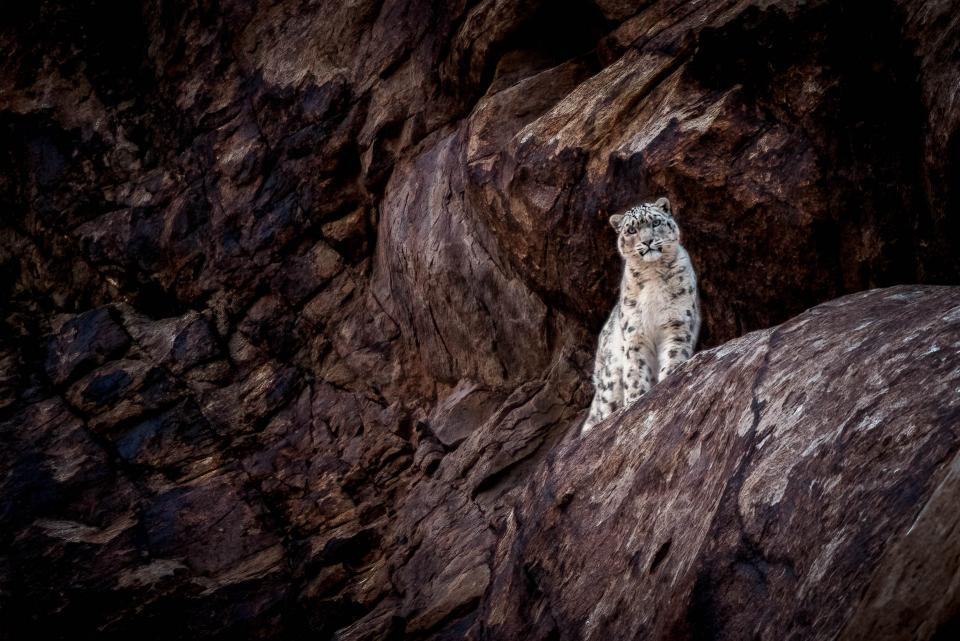
Cost per person is $15,499
Single supplement is $5,999
This eleven day expedition is focussed on viewing the extremely elusive Snow leopard in its natural habitat - the high Himalayas of Ladakh, India. We will spend seven nights at 12,000 feet searching each day for Snow leopards, the apex predator of this high altitude region. Of course our team of expert spotters are always on the look out for other wildlife including the Himalayan wolf, Eurasian lynx, Blue sheep, Ibex and Ladakh Urial. Plus of course we will see amazing bird life including Lammergeier, Golden eagles, Ravens and Magpies to name a few.
Importantly we are confident you will see Snow leopards, but it is extremely important you travel with excellent optical gear, the Snow leopards may not be close and you will want quality camera lenses and binoculars, please consult with us about what optics you plan to bring.
In keeping with the principles of responsible ecotourism:
We will make a donation to the High Asia Habitat Fund.
We will employ local people.
We will use locally owned and operated lodges and outfitters.
We will use local goods and services.
This is an ecotour that will make a difference to you and to the places we visit.
Upcoming Dates
Sunday, March 15, 2026 to Wednesday, March 25, 2026
Availability — OPEN to enrollment
Itinerary
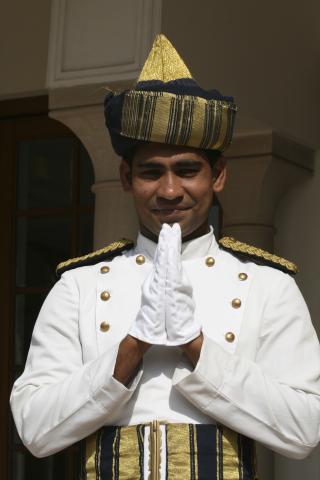
Day 1: Arrive Delhi
On arrival at the Indira Gandhi International Airport, you will be met by our representative who will escort you through Customs and Immigration, making sure you are seamlessly transferred to the hotel.
Delhi is the Capital City of Independent India. It rewards the determined sightseer with more than a thousand monuments and two old capital building complexes - including the present seat of Government, designed by the British architect Sir Edwin Lutyens. Delhi also offers a glimpse into the real India: the labyrinthine street bazaars of Old Delhi, and the temples and monuments of India’s checkered colonial past. In the deepest sense, from Old Delhi’s Red Fort and the Jama Masjid Mosque to New Delhi’s chic art galleries and nightclubs, Delhi is a profoundly Indian city. Turbaned shepherds still lead goats and sheep through ravines in Delhi’s remaining open fields, and even near the airport. Delhi is a city on the move and the gateway to India.
The Welcome Dinner is at the Hotel Restaurant this evening - here you will meet your Indian Naturalist / Ecotour leader Harsha Jayaramaiah, as well as the rest of the group at dinner.
Overnight at Trident Gurgaon Hotel (D)
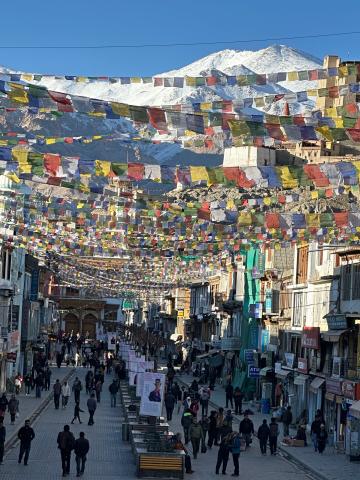
Day 2: Delhi to Leh, Ladakh
This morning we fly from Delhi to Leh, and upon landing we immediately transfer to the Grand Dragon Hotel where we begin our acclimatization to the high altitudes we will experience this week. For the next ten days we will be operating at altitudes over 12,000 feet above sea level, so it is critically important to allow our bodies to adjust to the altitude.
Leh is a part of the historic Silk Route and remnants of this vibrant era are all around - temples, monasteries, stupas and ancient markets. We spend the day relaxing at the hotel in Leh.
Overnight at the Grand Dragon Hotel (B,L,D)
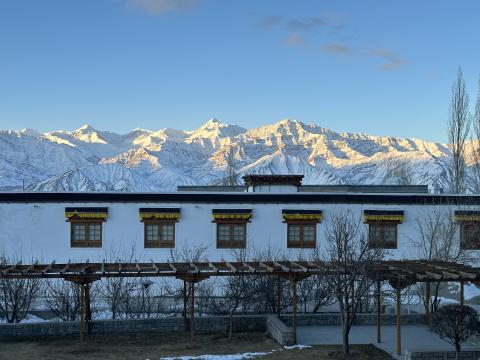
Day 3: Leh, Ladakh - acclimatization
A second day of acclimating and we plan to explore the city of Leh, with a visit to the Leh Palace, and after lunch perhaps we will drive to visit the Alchi Monastery, and a sightseeing drive to the Ulley Valley in search of Urial, Blue sheep, perhaps Himalayan Ibex or other wildlife. We return back to our base in Leh for a final night of phone, internet and other trappings of civilization!
Overnight at the Grand Dragon Hotel (B,L,D)
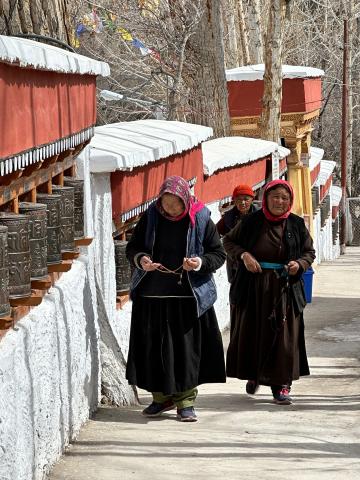
Day 4: Leh to Lungmar Remote Camp
This morning we drive to our base for the next seven nights, the only luxury camp in the region, Lungmar Remote Camp that has a very comfortable main lodge and five bedrooms with en-suite bathrooms / hot showers, and this remote lodge has dramatic views of the Lungmar Valley. For the next seven nights our itinerary is driven by what our team of spotters find each day. Our team of six spotters head out at sunrise each day and search for signs of a Snow leopard. The spotters all have powerful Swarovski spotting scopes and will radio back to the lodge if a cat is spotted.
Even if a cat is not found at first light, we then join some of the spotters to search nearby valleys for signs of a kill, or a Snow leopard on the move.
Overnight at Lungmar Remote Camp (B,L,D)
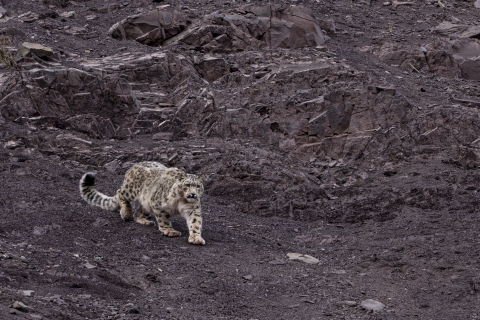
Days 5 - 10: Lungmar Remote Camp
Each morning our team of professional spotters head out at first light, searching nearby valleys for signs of a Snow leopard on a kill, or on the prowl. If a Snow leopard is spotted they communicate to the lodge and we head out with our multiple layers and cameras / binoculars. Depending on the situation we may stay out all day with the wildlife and a hot lunch will be delivered to us in the field.
This pattern is repeated each day, and we must always be ready to go.
Overnight at Lungmar Remote Camp
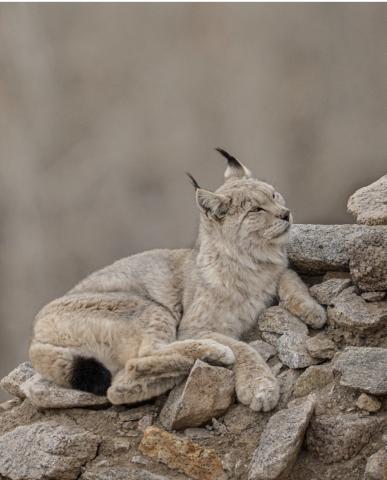
Day 11: Lungmar to Leh and flights headed home
Today we sadly depart Lungmar Remote Camp and return to Leh for a morning flight back to Delhi. We should be in Delhi around 1pm and you can schedule flights headed home for any time after 5pm. A day room is reserved at a hotel in Aero City close to the Delhi International Airport to allow you to freshen-up before beginning the long flight home.
Roseate Hotel - day room (B,L)
Travel Information
Thanks for choosing India with Terra Incognita Ecotours, Inc. It is our pleasure to help you plan for your upcoming ecotour. To ensure that your travel arrangements are made to your satisfaction, please take a few minutes to read through this information.
What you need to have with you on your trip:
Passport: If you are a U.S., U.K., Australian or Canadian citizen, you will need a passport, valid for six months from the date of completion of your trip.
It is always a good idea to make a photocopy of your airline tickets and of the pages of your passport that have the number, your photograph and other pertinent information. Keep the copies separate from the originals.
Visas: Please consult the India consulate or embassy nearest you for visa requirements to enter India. If a visa is required, you are responsible for obtaining it.
Documents for children under the age of 18, not traveling with both parents: The U.S. government is increasingly requiring that minors under 18 years of age traveling alone, with grandparents, or with one parent/legal guardian only, carry a notarized document signed by both parents or by the parent/legal guardian not traveling with the child. We suggest you obtain such a document (noting the age of the child, relationship to traveling adult(s), dates of travel, and destination) to avoid potential problems. For example, in the case of divorce, the parent with legal custody must sign the permit, and the accompanying adult must carry proof of this fact. In addition, if the child’s surname differs from that of either parent, you may want to carry the child’s birth certificate.
Emergency Contact number while on your ecotour:
Call COLLECT (813) 476-2810
Practical Information
India is the seventh-largest country by geographical area, and recently became the most populous country with over 1.3 billion people, and the most populous democracy in the world. Bounded by the Indian Ocean on the south, the Arabian Sea on the southwest, and the Bay of Bengal on the southeast, it shares land borders with Pakistan to the west; Bhutan, the People's Republic of China and Nepal to the northeast; and Bangladesh and Burma to the east. In the Indian Ocean, India is in the vicinity of Sri Lanka and the Maldives; in addition, India's Andaman and Nicobar Islands share a maritime border with Thailand and Indonesia.
Currency: The currency of India, is the Rupee (INR). The exchange rate as of May 2022 was 1 US$ = 77 INR. Major credit cards are generally accepted at hotels and larger stores. U.S. dollars are not widely accepted in India, so we suggest you change currency on arrival for smaller purchases such as taxis, refreshments or miscellaneous expenses.
Health: All information we obtain regarding health precautions is received from the Centers for Disease Control in Atlanta at 404.332.4559 or www.cdc.gov.
Please note that Terra Incognita Ecotours, Inc., as a travel company, is in no way authorized to prescribe any inoculations or medications. We recommend that you consult your personal physician for medical advice, showing him or her the brochure that indicates the places you will be visiting. Your physician is most familiar with your personal medical history and is best qualified to determine your particular needs. It is always advisable to have physical and dental check-ups before you leave.
At the present time, no specific immunizations are required for this ecotour, although the CDC recommends the following:
Hepatitis A or immune globulin (IG). Transmission of hepatitis A virus can occur through direct person-to-person contact; through exposure to contaminated water, ice, or shellfish harvested in contaminated water; or from fruits, vegetables, or other foods that are eaten uncooked and that were contaminated during harvesting or subsequent handling.
Hepatitis B, especially if you might be exposed to blood or body fluids (for example, health-care workers), have sexual contact with the local population, or be exposed through medical treatment. Hepatitis B vaccine is now recommended for all infants and for children ages 11-12 years who did not receive the series as infants.
Malaria: your risk of malaria may be high in parts of India. See your health care provider for a prescription of an anti malarial drug.
Rabies, pre-exposure vaccination, if you might have extensive unprotected outdoor exposure in rural areas, such as might occur during camping, hiking, or bicycling, or engaging in certain occupational activities.
Typhoid vaccine. Typhoid fever can be contracted through contaminated drinking water or food, or by eating food or drinking beverages that have been handled by a person who is infected. Large outbreaks are most often related to fecal contamination of water supplies or foods sold by street vendors
As needed, booster doses for tetanus-diphtheria, measles, and a one-time dose of polio vaccine for adults.
Altitude Sickness
All of your trip goes above 3000 meters / 9,800 feet where it is common for travelers to experience some adverse health effects due to the altitude - regardless of your age, gender and fitness.
Before your trip
Some pre-existing medical conditions are known to severely worsen at high altitude and be difficult to adequately treat on the ground, leading to more serious consequences. It is imperative that you discuss your pre-existing medical condition/s with your doctor. Many doctors prescribe acetazolamide (Diamox) for prevention of high altitude sickness. We cannot say if this is suitable for you. Please discuss these options with your doctor.
During your trip
Our high altitude trips are built with staged ascent in mind. Rest days are built in - please cooperate with your trip leader and our camp staff when they advise you to rest all day when you arrive at altitude. It will help your trip run smoothly. In our experience with hundreds of guests of all ages and from all regions, everyone that rests well on day 1, and takes it easy on the day 2 has, on average, a trip with no issues of concern regarding altitude and just the usual mild symptoms of altitude at the start. Remember, checking with your doctor about your concerns about altitude before you come, is important.
While most of our leaders have basic first aid training and have considerable experience at high altitudes, it is very important that you are aware of the cause and effects of traveling at altitude, monitor your health and seek assistance accordingly. Communicating with your trip leader is always great.
Please also note:
A certificate of yellow fever vaccination may be required for entry into certain countries in South-east Asia. For detailed information, see Yellow Fever Vaccine Requirements and Information on Malaria Risk and Prophylaxis, by Country. Also, find the nearest authorized U.S. yellow fever vaccine center.
Swimming: There will be opportunities to swim during the ecotour, specifically in Delhi. You should bring a swimsuit if you may swim. Since you will have time to swim, for added protection from the sun you may wish to wear a T-shirt while swimming.
Time Difference: India is 5 and 1/2 hours ahead of Greenwich Mean Time.
Weather: India's climate is strongly influenced by the Himalayas and the Thar Desert, both of which drive the monsoons. The Himalayas prevent cold Central Asian katabatic winds from blowing in, keeping the bulk of the Indian subcontinent warmer than most locations at similar latitudes. The Thar Desert plays a crucial role in attracting the moisture-laden southwest summer monsoon winds that, between June and October, provide the majority of India's rainfall. During our visit in March, the mornings can be quite cold, the evenings will be cool, and the days will hover around freezing in the Himalayas where most of this ecotour takes place.
Please remember that the sun’s rays are more vertical than you may be used to, so you can sunburn more easily. Be careful of the midday sun.
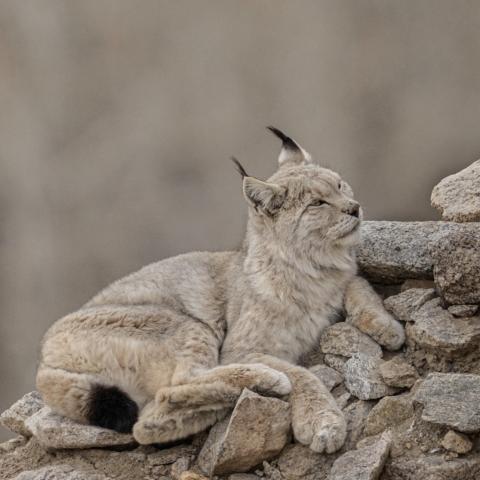
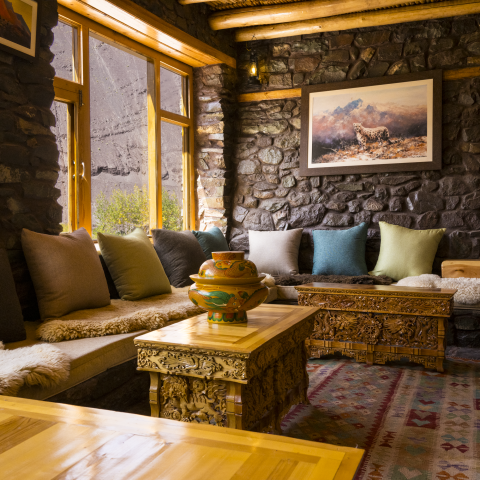
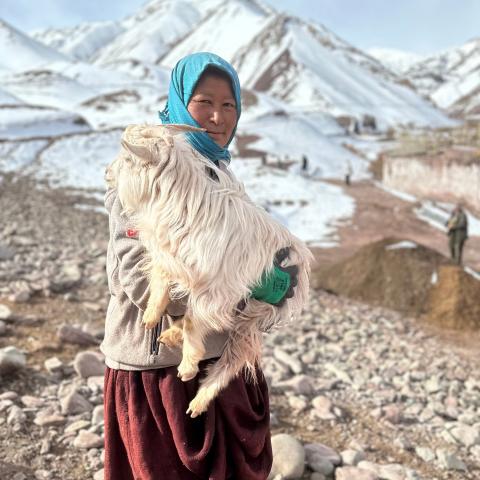
Lodging Info
Trident Gurgaon, Delhi
Trident Gurgaon is conveniently located close to both the Indira Gandhi International Airport and the Delhi domestic airport terminal. Boasting plush and spacious interiors, lies an oasis where you can smell the fresh grass, hear the birds sing and simply pause for pleasure. Designed by Thai architect, Lek Bunag, Trident, Gurgaon is low-rise and spread over seven acres. You will find influences of Moroccan, Mughal and Rajasthani style in its architecture. The beige dome-like traditional exterior houses 136 contemporary rooms, furnished with all the modern amenities for discerning guests, including complimentary high-speed Internet for up to four devices. Trident, Gurgaon ranks amongst the best hotels in Delhi.
Grand Dragon Hotel, Leh
Established in the year 2007, The Grand Dragon Ladakh, is the first 5 star hotel in Leh Ladakh, it is owned and operated by the Abdu family from Leh, who have more than 40 years of experience welcoming visitors to the beautiful region. It is decorated magnificently with handmade paintings by Gulam Mustafa (First modern Artist of Ladakh) around every corner, and fixtures that are reminiscent of royalty. Located in the center of town the hotel boats all modern conveniences, WiFi, Satellite TV, en suite bathrooms, in room safe, tea and coffee makers in every room. It is an extremely comfortable hotel to spend our time acclimating to the altitude.
LUNGMĀR Remote Camp
As High Asia’s premier wilderness camp, LUNGMĀR is the pinnacle of what is possible in the greatest mountains on our planet. At 12,000 feet above sea level, in the heart of 25,000 hectares of prime habitat, and supported by an elite team of specialists, the LUNGMĀR is your base for perhaps the greatest quest of all - a search for the Snow leopard. All of the LUNGMĀR’s accommodations are centrally heated and beautifully appointed, with en-suite bathrooms and hot/cold running water, all rooms feature hand-knotted rugs, Tibetan inspired furniture, king or twin sized beds, and comforts unseen before in remote winter accommodations in High Asia.


